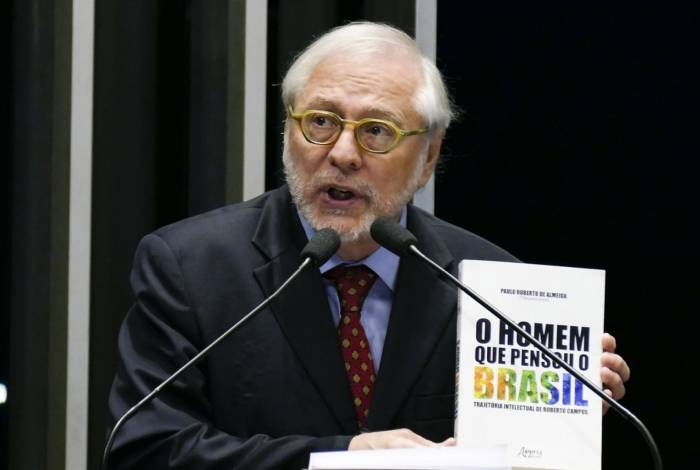O embaixador Paulo Roberto de Almeida é um dos poucos diplomatas que expõe publicamente a opinião sobre assuntos polêmicos do Itamaraty. Em março, acusou o ministro das Relações Exteriores, Ernesto Araújo, de demiti-lo da presidência do Instituto de Pesquisa de Relações Internacionais por divergências ideológicas, depois que publicou em seu blog pessoal um texto de Fernando Henrique Cardoso. Ao contrário de seus colegas formados no Instituto Rio Branco, ele não tem medo de dizer o que pensa sobre uma possível indicação do deputado Eduardo Bolsonaro à embaixada brasileira nos Estados Unidos. "Ele não tem capacidade nenhuma", disse, em entrevista à BASE:
BASE - Como o sr. avalia a intenção anunciada do presidente Bolsonaro de designar o filho, deputado Eduardo Bolsonaro, para a embaixada brasileira nos Estados Unidos?
Paulo Roberto de Almeida - Está tudo errado desde o início. O fato de o presidente ter anunciado indicar porque ele seria uma boa pessoa, porque fala inglês, fala espanhol, que é amigo dos filhos do Trump, isso é uma ruptura, é uma quebra de padrão diplomático jamais vista na diplomacia brasileira e possivelmente nos anais da diplomacia mundial.
BASE - Qual o padrão a ser seguido?
Paulo Roberto - Em primeiro lugar, isso deve ser mantido em segredo. Deve ser comunicado através de nota secreta a outro país, informando sobre a intenção de designar tal pessoa como representante. Qual o motivo do segredo? O país pode decidir que não quer aquela pessoa. Isso é uma quebra de padrão diplomático, uma grosseria. Ele (presidente Jair Bolsonaro) não tem nenhum sentido de política de Estado, de Relações Internacionais. Trata a presidência como se fosse a sua casa, a sua família, a sua seita. É uma coisa histriônica.
BASE - Além da quebra de sigilo, quais outros problemas dessa possível indicação?
Paulo Roberto - Primeiro, a Constituição proíbe o nepotismo. Nesse caso, seria mais que nepotismo, seria filhotismo. Estaria nomeando o filho para um cargo de alta relevância. Aliás, Marco Aurelio Mello (ministro do STF) disse que isso é nepotismo, não passa. O certo seria pedir o agreement (aprovação) em segredo. Se o país aceitar, mandaria ainda em segredo para o Senado a mensagem, porque os senadores podem recusar. Nesse caso você está incorrendo em nepotismo e está quebrando o princípio de confidencialidade.
BASE - Já houve indicação de não-diplomatas para a embaixada brasileira nos Estados Unidos?
Paulo Roberto - No segundo governo Vargas tivemos o almirante Amaral Peixoto, casado com a filha do presidente Getúlio Vargas. Mas era um almirante, tinha ampla experiência. Teve o Walter Moreira Salles, aliás duas vezes. Depois, teve o Juracy Magalhães, aquele que falou que o que é bom para os Estados Unidos é bom para o Brasil.
BASE - O sr. acredita que Eduardo Bolsonaro tem os requisitos para ocupar o posto de embaixador?
Paulo Roberto - Ele disse que esteve nos EUA em intercâmbio há dez anos e fritou hamburger
(veja aqui). Imagine qual a capacidade desse cara. Ele passeou com o chapéu de "Trump 2020" duas vezes, ofendeu todos os compatriotas ao falar que os brasileiros ilegais são uma vergonha. Uma vergonha é ele falar uma coisa dessas. Os brasileiros trabalham lá porque não têm oportunidade de trabalhar no Brasil e estão mandando milhões de dólares para cá. Ele não tem nenhuma capacidade. Nenhuma.
BASE - É um problema de formação, então?
Paulo Roberto - Mesmo que ele fosse doutor em qualquer coisa, o simples fato de ser um trumpista fundamentalista já o desqualificaria para o cargo. Não se manda para um país alguém que abertamente faz campanha. Isso é inconstitucional e anticonstitucional. A Constituição tem no artigo 4 o famoso princípio da não-intervenção em assuntos internos de outros países. Imagine que o Trump ano que vem não seja eleito. Qual a cara da nossa diplomacia? A cara do presidente que suceder o Trump? É uma coisa horrível. É ilegal, irregular no plano das relações internacionais e práticas diplomáticas, absolutamente vergonhoso pelo personagem, por tudo. O presidente não tem consciência da sua postura em função de políticas de Estado. Age como se fosse a sua casa.
 Eduardo Bolsonaro in Brasilia, Brazil, on May 7. (Joédson Alves/EPA-EFE/REX)
Eduardo Bolsonaro in Brasilia, Brazil, on May 7. (Joédson Alves/EPA-EFE/REX) Eduardo Bolsonaro in Brasilia, Brazil, on May 7. (Joédson Alves/EPA-EFE/REX)
Eduardo Bolsonaro in Brasilia, Brazil, on May 7. (Joédson Alves/EPA-EFE/REX)